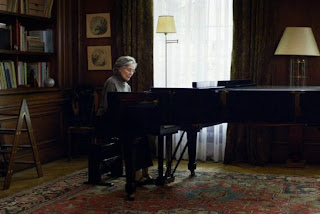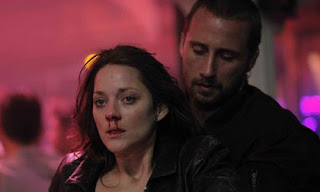Side Effects
*** out of ****
Directed by: Steven Soderbergh
Starring: Jude Law, Rooney Mara, Channing Tatum, Catherine Zeta-Jones and Vinessa Shaw
Running Time: 106 minutes
Steven Soderbergh’s supposed swan
song (at least, on the big screen) is a thriller with many moods and faces, as
well as a mystery full of misery. Like many of the director’s previous efforts,
Side Effects is full of liars and
schemers, although it is not always clear who is doing the lying and scheming.
It’s a solid film to exit with,
although not a spectacular one, since Side Effects is more notable for its twisty
screenplay. The presence of a directorial master behind the camera is secondary
to the characterization and story structure.
The psychopharmacological drama
details the unpredictable relationship between Emily Taylor (Rooney Mara) and
her psychiatrist, Jonathan Banks (Jude Law). With a perpetually glazed-over
expression, Emily is deeply unhappy. Her husband Martin (Channing Tatum)
returns from prison for an insider-trading sentence, but his presence does
little to enliven her.
After an apparent suicide attempt, Banks
takes Emily under his wing and starts prescribing her antidepressants to try to
help her “live through chemistry,” as he calls it. Banks puts Emily on an
experimental new drug, Ablixa, to mend her sunken state.
However, Emily commits a crime while
sleepwalking, a potential result of the drug. As she awaits trial, her memory
is foggy, without any recollection of criminal intent. The fingers start
pointing at Banks, criticizing him for neglectful practice, which harms the
doctor’s professional and personal life.
The screenplay from Scott Z. Burns (Contagion) is two-pronged, rotating from
Emily’s anxious perspective in the first third to Banks’ desperation, as his
patient’s enigmatic actions put his career in jeopardy. Characters often quote William
Styron’s memoir of depression, Darkness Visible. Emily describes it her
melancholy as “a poisonous fog bank rolling in,” and Mara is unflinching in the
role.
Thin and faint, Mara internalizes her
character’s misery and effectively downplays the hysteria, letting external
elements speak for Emily’s mental commotion. Soderbergh disorients the audience
to adopt Emily’s view by blurring or blackening small details in many of her
scenes, reflecting the shrouds of mystery and darkness in her life.
Meanwhile, Thomas Newman’s piercing,
icy score brings us to the brink of Emily’s delicate, drug-addled paralysis.
The opening shot of the film, zooming and tightening on a nondescript New York
apartment, is a direct homage to Psycho, another mystery with a mentally
imbalanced character with mysterious motives.
Mara and Law are quietly powerful,
although the latter actor eventually gets the more interesting character arc as
the film shifts focus to his struggle to maintain a balance between work and
ethics.
As Side Effects moves toward its curvy final act, it becomes
exposition-heavy, with Burns’ script setting up some of the turning points
unnaturally. The writing is smart until some of the film’s contrivances shine
though. A sensuous psychiatrist played by Catherine Zeta-Jones is also thinly
conceived, almost inconsequential until the rote ending.
Side Effects is an involving
mystery and a well-acted character drama, despite its unwieldy final minutes. As
the finale to an excellent director’s eclectic career, it leaves a
bit to be desired. On its own, though, it’s a fine little thriller.






















